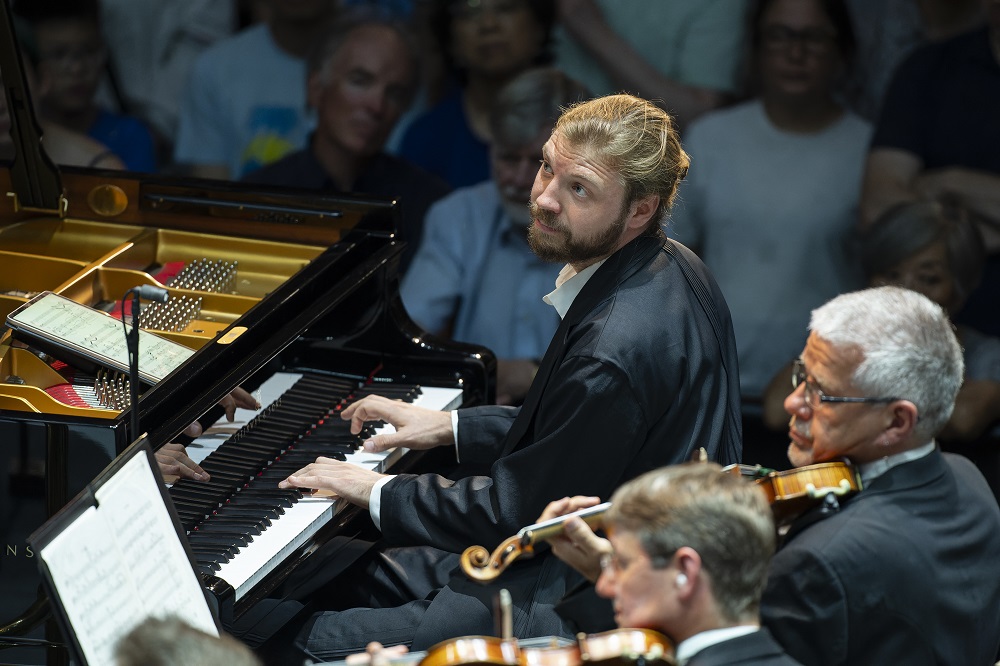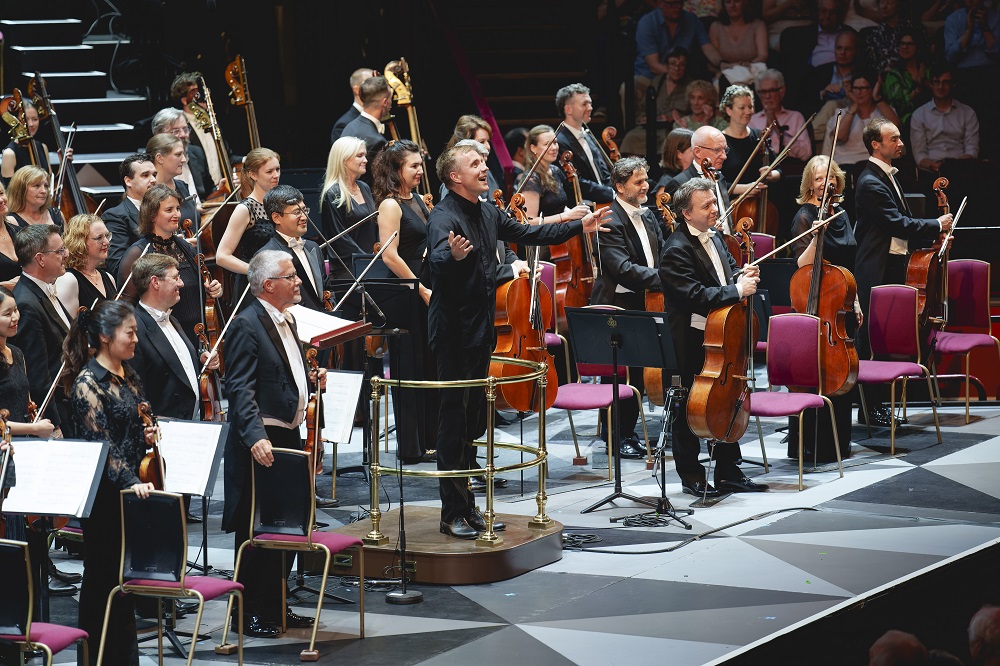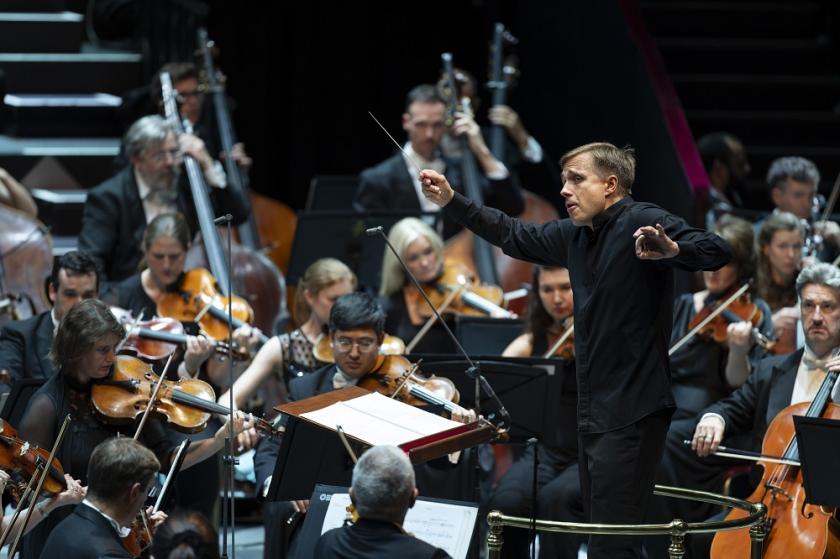Under its master music director, the once-torpid Royal Philharmonic Orchestra has given us some of the most brilliant concerts of the 2023-4 season. Their Prom together changed course from the Elgar/Rachmaninov theme and dared even more, placing together four works in three parts each – two with atmospheric outer sections flanking vivid ceremonials (Ives, Debussy), two placing the lyricism at the dead centre (Ravel, Tchaikovsky).
To label it a vintage Prom in form, a new work would have been necessary. But Charles Ives’ Three Places in New England still sounds like one, and its big symphonic version wasn’t pieced together for live performance until 1975. It doesn’t pop up too often in concert programmes – the rhythmic mastery needed for the central Fourth of July romp at Putnam’s Camp is hair-raising – and yet two performances have come along in London within weeks.
The first, splendidly handled by Tom Fetherstonhaugh and the young Fantasia Orchestra in Hampstead Garden Suburb, gave us the chamber version Nicolas Slonimsky requested of Ives in 1929. Albert’s colosseum suits a bigger string section watercolouring the vasts and perspectives of time’s mists in the outer movements to perfection, as it was also to do with the comparable “Nuages” and “Sirènes” of Debussy’s Nocturnes in the concert’s second half. If the obbligato coughing was a way for some members of a packed audience to express their concern at the dissonances, it eventually subsided. Vasily Petrenko made sure there was no diffusion of sound when Ives snaps into an eccentric present; what a daring and successful curtain-raiser.  Denis Kozhukhin (pictured above) is one of those pianists who “own” the utterly delectable Ravel G major Piano Concerto - Bavouzet, Chamayou and Osborne are among the others – though his way with it is characteristically individual: more romantic than jazz-age, playing with some of the solo passages in the manner of inspired improvisation. In this he was perfectly matched by RPO harpist Suzy Willison-Kowalec in that bewitching passage where the first-movement romp comes to a standstill. RPO woodwind, as good as any in London, carried off their air-cooling solos in the Adagio assai – we needed them on a sweaty, stormy evening where the air conditioning of the hall wasn’t much help – and shrilled piercingly in the Jacques Tati-esque finale.
Denis Kozhukhin (pictured above) is one of those pianists who “own” the utterly delectable Ravel G major Piano Concerto - Bavouzet, Chamayou and Osborne are among the others – though his way with it is characteristically individual: more romantic than jazz-age, playing with some of the solo passages in the manner of inspired improvisation. In this he was perfectly matched by RPO harpist Suzy Willison-Kowalec in that bewitching passage where the first-movement romp comes to a standstill. RPO woodwind, as good as any in London, carried off their air-cooling solos in the Adagio assai – we needed them on a sweaty, stormy evening where the air conditioning of the hall wasn’t much help – and shrilled piercingly in the Jacques Tati-esque finale.
All details came through with pinpoint precision in a score this venue doesn’t easily favour, and Petrenko kept tabs on Kozhukhin even in the final sprint. The temperature dropped to crypt-cool for the ideally contrasted encore – yes, reader, I guessed right from dim memory, though had to go over to the broadcast this morning and wait until the start of the second half when Tom Service finally told it was “In the Church” from Tchaikovsky’s Album for the Young.  The woodwind stars of the Debussy Nocturnes were cor anglais player Patrick Flanaghan and flautist Emer McDonough: how masterfully the composer delays her cloud-lift melody in “Nuages”, and how many extra mysteries he keeps on unveiling in “Sirènes”. The upper voices of the Philharmonia Chorus may have been a bit too close to the orchestra physically, but they wrought their own colour changes like professional singers: a beautiful complement to the super-subtle orchestra.
The woodwind stars of the Debussy Nocturnes were cor anglais player Patrick Flanaghan and flautist Emer McDonough: how masterfully the composer delays her cloud-lift melody in “Nuages”, and how many extra mysteries he keeps on unveiling in “Sirènes”. The upper voices of the Philharmonia Chorus may have been a bit too close to the orchestra physically, but they wrought their own colour changes like professional singers: a beautiful complement to the super-subtle orchestra.
Would Tchaikovsky’s Francesca da Rimini crown the evening down in Dante’s Inferno? The framing whirlwinds made me wonder: Petrenko’s approach was brisk, almost lightweight. But how he shaped the long central lovers’ recollection of happiness in present misery reminded us why his recorded Tchaikovsky and Shostakovich symphonies cycles with his previous orchestra, the Royal Liverpool Philharmonic, are among the best. The love-scene is so extended that conductors in the past used to cut whole sequences, but Petrenko kept it moving without ever over-urging and every moment here was painfully exquisite, led by the shy, at first hollow sorrow of Katherine Lacy’s clarinet solo. And so a programme of fireworks and unusual colours was surmounted by the greatest possible human depths. Masterly.














Add comment